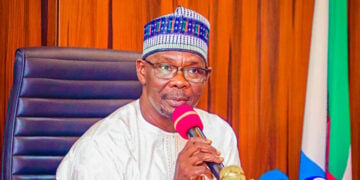The Customs Officers’ Wives Association (COWA) has launched the Sustainable and Green Borders Initiative—a nationwide programme designed to restore degraded ecosystems across Nigeria’s border communities while empowering women and youth through green enterprise and innovation.
This is as Comptroller-General of the Nigeria Customs Service (NCS), Bashir Adewale Adeniyi called for urgent and collective action to transform Nigeria’s border communities from zones of neglect into centres of opportunity and sustainability.
Speaking at the event, the CGC painted a vivid picture of the environmental and socio-economic despair facing many border towns—where “communities are choking under mountains of waste and young people have nowhere to go.” He stressed that such conditions fuel smuggling and insecurity, not because residents are criminals, but because “survival looks different when you are living on the edge of environmental collapse.”
Speaking at the launch in Abuja on Thursday, the National President of COWA, Mrs. Kikelomo Adeniyi, said the initiative represents “a move from awareness to action, and from policy to practice,” aligning the association’s goals with the Nigeria Customs Service’s modernization drive and the World Customs Organisation’s global sustainability agenda.
A central feature of the initiative, she announced, is the creation of the COWA Sustainability and Innovation Centre in Abuja—a pioneering hub that will promote renewable energy, recycling technology, and sustainable trade practices. The Centre will serve as a collaborative platform where “policy meets practice and innovation meets inclusion.”
According to Mrs. Adeniyi, the Centre will house a Green Skills Academy to train women and youth in solar technology, waste management, and eco-enterprise; an Innovation and Research Lab to support start-ups and universities working on circular economy solutions; and a Policy and Leadership Institute linking customs reforms with global best practices in sustainability.
It will also host a Green Enterprise Hub for small-scale recycling ventures and a Sustainability Knowledge Centre—a hybrid digital and physical library for climate data, environmental research, and policy evaluation.
Envisioned as a solar-powered, eco-friendly complex, the Centre will connect the Nigeria Customs Service with key ministries and international partners such as UNDP, UNEP, and the World Customs Organisation to drive a national model for green customs training and community-led innovation.
“The COWA Sustainability and Innovation Centre is not just about planting trees; it’s about planting hope, growing opportunities, and cultivating responsibility,” Mrs. Adeniyi stated, calling on government agencies, private investors, and civil society to support the initiative as a strategic contribution to Nigeria’s sustainable development agenda.
Adeniyi reminded participants at the summit that Nigeria, as current chair of the World Customs Organisation (WCO) Council, bears a global responsibility to model sustainability in border governance. He noted that “green customs” is already a strategic priority within the WCO framework, making it imperative for Nigeria to demonstrate leadership through tangible, community-based action.
Adeniyi urged a shift in perception—seeing border residents not as problems to be managed, but as partners in progress. He called for increased storytelling and global visibility to position Nigeria as a model for sustainability-driven border management. “The people closest to the problem are often closest to the solution,” he said. “Our job is to clear their path, provide the policy framework, resources, and recognition they deserve. When government agencies and civil society align around a common mission, extraordinary things happen—and that is what today represents: not ceremony, but real change.”
Commending COWA for the summit and its practical vision, the Customs boss said the initiative reflects the kind of grassroots commitment that mirrors the Service’s own Corporate Social Responsibility (CSR) goals. He lauded the women leading recycling and environmental restoration projects in border areas, describing their efforts as “real work that deserves real support, not bureaucratic acknowledgements.”
The Comptroller-General emphasised that the NCS and COWA are aligned in their shared mission to create sustainable and secure border communities. He noted that by investing in local women and youth, the Service and its partners are effectively building barriers against smuggling and environmental decay. “Every eco-enterprise we support is a barrier to smuggling that does not require a checkpoint,” Adeniyi said. “Prevention is cheaper than enforcement, and it is more humane.” He urged stakeholders to move from discussions to action by providing direct funding that reaches the grassroots—especially the women and young people who are driving change in their communities.





